
May 29, 1996
BEN BRADLEE: It's so hard to define character just as one thing. Honesty -- nobody's mentioned pure, honest to God honesty here. And, yet, that seems to me -- if I really believed a man wouldn't lie I would vote for him for president, period. I don't care what party.
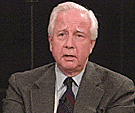 DAVID MCCULLOUGH: I don't think the question of unfaithfulness or telling lies is necessarily a measure of what character is. I think character has to do with something within the person that is strong, essentially strong and essentially determined to do what is right and to do what is best for the country and to have a sense of decency and fair play and to say what he means and mean what he says when it is in the utmost interest of the country and who will work as hard as he possibly can in what is an impossible job and trust us to understand that he's a human being.
DAVID MCCULLOUGH: I don't think the question of unfaithfulness or telling lies is necessarily a measure of what character is. I think character has to do with something within the person that is strong, essentially strong and essentially determined to do what is right and to do what is best for the country and to have a sense of decency and fair play and to say what he means and mean what he says when it is in the utmost interest of the country and who will work as hard as he possibly can in what is an impossible job and trust us to understand that he's a human being.
And I think that Harry Truman, for example, was a 19th century man. He thought that any person who cheated on his wife or on her husband was not to be trusted. Whether that still pertains to our judging of the ethics or morality of present day people is an arguable point.
What isn't arguable is whether they are chronic liars, whether they are people who never will take the blame. And I think an extremely important gauge of character is what kind -- kinds of people does he surround himself with. We are really judged by the company we keep and -- uh -- and we've seen presidencies that have really flopped because they weren't willing to have people around them.
Truman once was told, you know, if you have George Marshall for your Secretary of State, people might say he would make a better President than you. And Truman said he would make a better President, but I'm the President and I want the best possible people around me. Now, that's a measure of something inside Harry Truman that's enormously admirable and that we ought to encourage and say we want in our leaders.
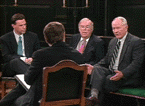 STEPHEN AMBROSE: A couple of other qualities -- are generosity of spirit. Using "we" instead of "I" is the simplest example -- Eisenhower never used the word "I". It was always "we," except one time when he wrote out the message that would be handed to the press in the event the landings failed. And there he used the personal vertical pronoun, it's my fault, I did it. Otherwise it was always "we".
STEPHEN AMBROSE: A couple of other qualities -- are generosity of spirit. Using "we" instead of "I" is the simplest example -- Eisenhower never used the word "I". It was always "we," except one time when he wrote out the message that would be handed to the press in the event the landings failed. And there he used the personal vertical pronoun, it's my fault, I did it. Otherwise it was always "we".
And another quality along with generosity of spirit is respect for others. A quick anecdote. Eisenhower was a first classman. A plebe running down the hall on some fool errand for a -- being hazed -- ran into him and knocked him down. Ike got up with a bellow and a rage and he braced this plebe and he let him have it and then he finally said, just as sarcastically as he could, what did you do before you came here, you look like you were a barber. And the kid who was already shaking he told his roommates, he said, I was a barber, sir. Ike went back to his room and said, I will never haze a plebe again as long as I live. I've just done something that is inexcusable, I made a man ashamed of what he did for a living.
And it always seemed to me to be the central difference between Ike and Dick -- that Ike had a fundamental respect for people who did honest work and who paid their bills and who were pillars of the community. Nixon never really did. Nixon didn't have a respect for others. And I think that's a part of character too, of recognizing there's only one path up the mountain, when you get to the very top and you've got to elbow everybody else aside on the way -- you got to have respect for the people you've left behind and I don't think that Nixon did.
JIM LEHRER: Michael Beschloss.
MICHAEL BESCHLOSS: I think one other problem with all this is that often times a quality we see in the human being looks very different in the leader. For instance, Harry Truman was a very loyal figure, so was George Bush. These were qualities that people admired very much in Truman and Bush.
But at the same time in Truman as a leader, loyalty drove Truman at times to be very loyal to people who were doing bad things in his administration, whom he should have actually fired, Truman was very slow in doing that. In the case of George Bush -- George Bush, I think it is very possible, when he was running for re-election, if he had switched Vice Presidents from 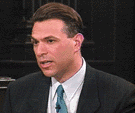 Dan Quayle to perhaps a Colin Powell or another figure, he might have saved his administration, he might have gotten a second term.
Dan Quayle to perhaps a Colin Powell or another figure, he might have saved his administration, he might have gotten a second term.
But Bush's private idea of what is loyal required that he keep Quayle on the ticket and the cost of really pursuing this could very well have been that he gave the nation to the Democrats for the next four years.
JIM LEHRER: So, here's a case where he had an admirable personal characteristic that was not a good thing for him to function as a President of the United States in either one of these cases, you're saying.
MICHAEL BESCHLOSS: Absolutely. And another case I think is perhaps an even more momentous one, in the late 1930's and the beginning of the 1940's, Franklin Roosevelt told mis-truths, he skirted the law, he did a lot of other things that in the end helped prepare the United States for war in Europe and Asia.
Historians in later generations look back on that and match ends to means. They say it was a bad thing that Roosevelt did not always tell the literal truth, but the result of this is something we honor very much.
In the case of Richard Nixon who skirted the law and told untruths, we look back and say he did not do this for a grand public purpose, he did it to save his own scalp, that's something we don't honor very much.
ROBERT DALLEK: That's exactly the point -- Steve was making it too -- a President who has vision, who has a commitment to the national well-being and shifts and maneuvers in the service of that vision, I think the public is very accepting of that.
JIM LEHRER: And that includes lying then. If you lie, and you do it for the right reasons, it's okay.
 ROBERT DALLEK: And people remember Roosevelt as a great leader who was serving the well-being of the nation and combatting Nazism. See, what I find most striking is this changes historically. When we look back on the greatest Presidents how do we remember them, we remember them as great characters.
ROBERT DALLEK: And people remember Roosevelt as a great leader who was serving the well-being of the nation and combatting Nazism. See, what I find most striking is this changes historically. When we look back on the greatest Presidents how do we remember them, we remember them as great characters.
Lincoln is remembered not because he was a Republican, but because he was such a great person, a great human being. We remember Washington that way. I think we remember Jefferson that way, FDR comes across to us. But it's his compassion, his generosity, a feeling for the people.
Eleanor Roosevelt -- uh -- after Franklin died some man stopped her on the street and said, I miss the way your husband used to talk to me about my government. Now, it was so telling, he had a connection to Roosevelt, to his personality, to his character, which I think echoes to this day, because so many people when they run for high office, run for the Presidency, they want to put themselves in FDR's shadow.
MICHAEL BESCHLOSS: But in a way you always need both things, you need both the personal character and you also need the public sense that the person is making the right decisions. For instance, we were talking about Ronald Reagan in 1980. A lot of people who voted for Ronald Reagan did so, not necessarily believing in the things that Reagan was promising to do when he was President.
He was in many ways more conservative than many of the people who voted for him. One of the phenomena you see all through the Reagan Presidency is a large number of people saying, I may not agree with a lot of the things that Ronald Reagan is passionate about, but I think this is a person of character whose qualities I admire that binds me to him and I'm willing to take a little bit of a risk and support him, even though I may not otherwise literally agree.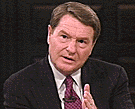
JIM LEHRER: Let me ask Jim Cannon a very direct question. The President you worked for, Gerald Ford, is generally conceded by everybody to be a very nice man, just in personal terms. Did that work against him as a President?
JAMES CANNON: No, I think that was one reason he got to be President. Of course, he was the one President who was chosen for his character. All these other Presidents were elected, but not he. He couldn't get himself elected, as it turned out, but he was chosen at a time when the country -- uh -- when the leaders in Washington at least knew that Nixon was doomed, Agnew had had to resign and -- uh -- Ford was chosen very simply by the Democratic leadership, because he was a man who could be trusted.
JIM LEHRER: Was that the test they gave, was that literally the test?
JAMES CANNON: Simplest test there was. Carl Albert and Mike Mansfield told Nixon this is the man who can be confirmed and Nixon had no choice, but to choose him then. And the reason Mansfield and Albert felt that way was because Nixon had so destroyed confidence in the government that these two Democratic leaders and others in the House and Senate felt this is the only man we get confirmed who can be trusted and who has the experience to do the job.
JIM LEHRER: But, yet, he could not be re-elected or he couldn't be elected on his own?
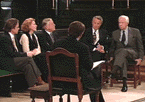 JAMES CANNON: He couldn't be re-elected on his own and part of the reason was -- a principal reason was that he -- that he pardoned Nixon and -- uh -- knowing that this would almost surely cost him any chance he had to win -- but he still felt it was the right thing to do. So, that was in my judgment an example of his character. It was the character for which he was chosen, but it was an element of his character that created the issue that caused him to be defeated.
JAMES CANNON: He couldn't be re-elected on his own and part of the reason was -- a principal reason was that he -- that he pardoned Nixon and -- uh -- knowing that this would almost surely cost him any chance he had to win -- but he still felt it was the right thing to do. So, that was in my judgment an example of his character. It was the character for which he was chosen, but it was an element of his character that created the issue that caused him to be defeated.
TOM WICKER: That's a good example of a matter character that worked against a President, a matter of character that most of us would say is a good issue, we're speaking of loyalty. I think of Jimmy Carter and the hostages in Iran, I did an article not long after that . Every single remember of the Carter administration that I interviewed said if he had only taken military action against Iran, he would have been re-elected.
He finally did the abortive helicopter thing and then compounded it all by going on television and taking the blame personally. I think all of those are, in a sense, good qualities. He refused to do something that he knew would be disastrous, even though it might be popular and then he took the blame for it. Those, it seems to me, are examples of good character and bad Presidential actions.
JAMES CANNON: There's another thing -- the character of Carter -- he decided to go ahead with the Panama Canal Treaty when it was unpopular, certainly in the South and everywhere else, but he thought it was the right thing to do, he did it and he made it stick.
JIM LEHRER: Ben Bradlee, how would you balance these things, I mean, the idea that you do something out of the good side of you, in terms of your character, the example that has just been used and yet it works against you, it doesn't work politically.
BEN BRADLEE: I mean, you know, you can't win them all. You can't win them all. So, if that's the price of a good decision, that's the price of a good decision. Nobody's got to be President twice. I mean, Jerry Ford must sleep wonderfully at night, because he did the right thing and I'm sure that's why Jimmy Carter appeals to us as much as he does.
So, it cost him the re-election. If he trimmed his sheets a little and done all that, we would have said there's a guy who trimmed his sheets and he wasn't quite --
JIM LEHRER: So you would agree with Jim Cannon that when Gerald Ford pardoned Richard Nixon, that was an act of character on his part.
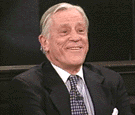 BEN BRADLEE: Well, I -- you and I would disagree on that.
BEN BRADLEE: Well, I -- you and I would disagree on that.
JIM LEHRER: Whether you agree whether he should or not --
BEN BRADLEE: I think his timing and the failure to exact something that he could have gotten was what did it not the pardon itself.
STEPHEN AMBROSE: That's right. You got to remember he had to pardon him. Jerry Ford could think through to the future and a trial going on in the summer when he was running for re-election --
BEN BRADLEE: He had to get something for it, I think.
STEPHEN AMBROSE: That's right.
BEN BRADLEE: And I think perhaps that's why he didn't get elected. But he certainly didn't --
STEPHEN AMBROSE: It's Nixon's fault. Nixon could have gone on television and said, I accept this pardon -- "I thank you, Mr. President" --

| Welcome | Broadcast | Essays | Forum | Quotes | Links | Home